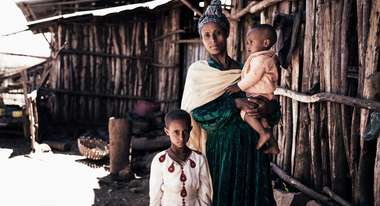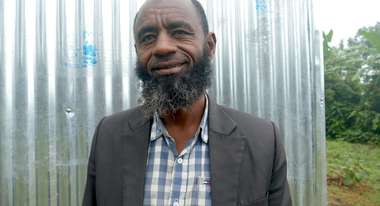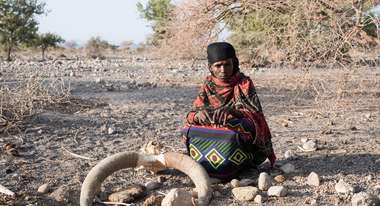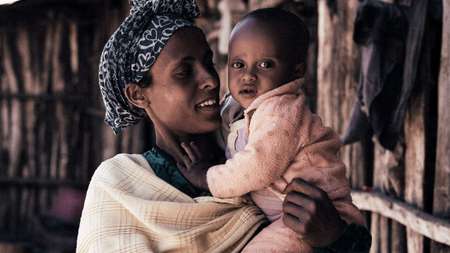
A Healthy Diet for Mother and Child
Sometimes Alemie Dawit* can hardly believe how things have turned out in her life. "Look how well my baby is doing," the Ethiopian says happily. But when her gaze falls on her seven-year-old daughter, her smile fades. Ayana squats at her feet and scribbles figures on the dry earth with a little stick. The girl is slender and delicate, far too small for her age. "For my daughter, the project came too late," Alemie says dejectedly. "She was losing more and more weight, was often sick, and we didn't know why."
Hunger and poverty determine the everyday life of the people
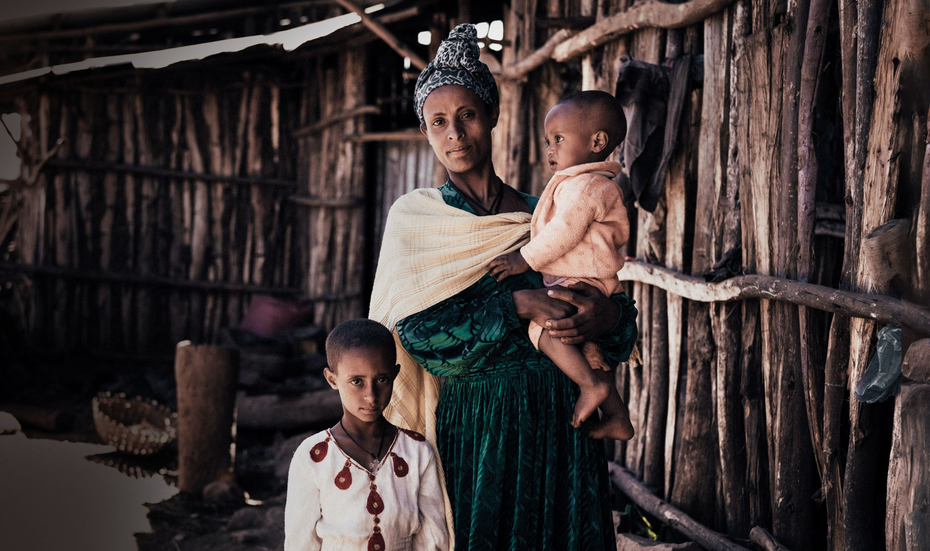
Ayana's fate is shared by many girls and boys in the Amhara region: 97 percent of children under the age of two do not get enough or sufficiently nutritious food to eat. Almost half of the children under five are not physically developed to their age due to malnutrition. This is not surprising, since poverty and hardship determine the daily lives of the people, most of whom live from farming and animal husbandry. But the conditions for agriculture are conceivably poor; traditional methods of animal husbandry and cultivation cannot cope with increasing droughts, and there is a lack of irrigation facilities. The Amhara region in northern Ethiopia is one of the poorest areas in the Horn of Africa. In the arid highlands, harvests are barely sufficient for the basic necessities of life.
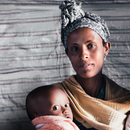
I did not know at that time how important a healthy diet is for me and my child
Alemie Dawit Alemie and her husband are participants in a Welthungerhilfe agriculture and nutrition project."Our life was very hard," Alemie says, "We had an ox with which we cultivated our small field. We worked hard and cultivated like our parents and before them their parents. But the harvest was barely enough to survive. We had no reserves, often lacking seed when we should have been sowing." As a result, the family often went to bed hungry and lived on one meal a day. Food such as nutrient-rich vegetables, fruits, meat or dairy products were unaffordable for them. Their diet did not change when Alemie became pregnant with Ayana.
The first 1,000 days determine a child's development
"I didn't know at the time how important a healthy diet was for me and my child," says Alemie. Even the older people in the village didn't realize that pregnant women and nursing mothers need to pay special attention to their diet. How could they? No one in the remote region had ever heard of the crucial window of opportunity. The first 1,000 days of life affect the development of the entire life. So Ayana, like so many other children in the village, suffered from chronic malnutrition.
Everything started to change when the team from ORDA (Organization for Rehabilitation and Development in Amhara) became active in the community. The Ethiopian partner organization of Welthungerhilfe presented the project for sustainable food and nutrition security in the highlands of Amhara. For this, the local government rounded up people from the surrounding villages. Alemie's husband Tarko also attended and registered. "A short time later, we received 50 kilograms of wheat, malt barley and millet," Alemie says.
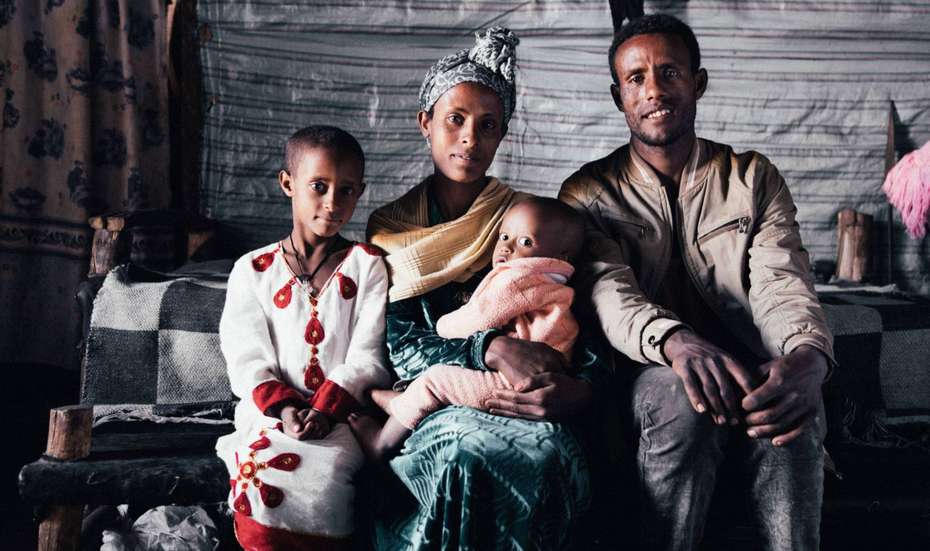
New agricultural techniques bring success
ORDA professionals trained participants in improved farming techniques. "We learned to sow and fertilize the grain in rows," Alemie reports. "My husband plowed the field with our ox, and I walked behind him and spread the seed." And it took off: The very first harvest yielded 900 kilos for the young couple. "We could feed ourselves well from that, now there was regularly food in the afternoon, and we could still sell something at the market."
From the income they purchased a larger piece of land directly on the road and built a house made of wooden slats, branches, clay plaster and corrugated iron roof. Alemie learned everything she needed to know about keeping chickens, producing eggs and raising sheep. She received chicks and feed from the project, as well as a ram of the hardy Washera breed, with which she has raised a small flock of sheep. She sells the eggs on the street as well as wood for cooking and heating. The wood is now available from the project's three community forestry areas, where unemployed young people earn a living while protecting the environment.
The consequences of climate change are clearly noticeable
In the Ethiopian savannah landscape, it is particularly clear how closely hunger and poverty are linked to the consequences of climate change: Weather extremes such as prolonged droughts or sudden heavy rains and floods have been becoming more frequent and more severe for years. Harvests are declining, and people are cutting down more and more trees for new arable land or firewood. As a result, the soil becomes poorer, wind and water wear away the fertile topsoil, and yields collapse once again. Added to this is the acute shortage of water.
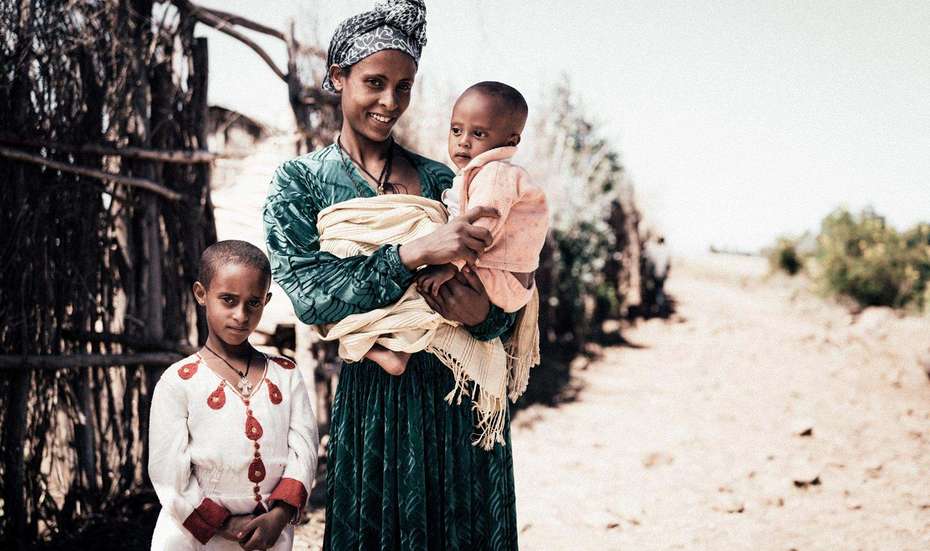
Young mothers receive nutrition training
The Welthungerhilfe and ORDA project addresses these problems and finds solutions. Around 60,000 people benefit from the activities: fruit and vegetable gardens are planted, areas are reforested, wells are built and sustainable farming methods are introduced. Alemie took part in nutritional consultations and a practical training course on healthy cooking. Together with the other women of the village, she grew carrots, onions and cabbage, cooked nutrient-rich baby porridge, and learned about the benefits of breastfeeding and hygiene rules. The young mother is happy: "Dereje was so much luckier than his big sister, from the beginning he lacked nothing."
Alemie and Tarko invested their savings in a flour mill. "The mill gives us an income, but it's also important for the community because people no longer have to go all the way to town," says Tarko Dawit. It's going so well that they employ ten young men to do the heavy lifting, such as hauling the sacks, and a security guard.
The couple wants to continue taking advantage of their opportunities. "We want to expand our farm and open a small business," says Alemie. But the most important thing for the parents is that their children grow up healthy. They have laid the foundation for that. Even Ayana will find her way easier now.
*All names have been changed.
How Welthungerhilfe helps in the Amhara region:
- Degraded soils are rehabilitated and the biodiversity of the area is improved.
- Smallholders receive seeds and learn improved agricultural techniques in training courses to increase their yields.
- New fruit and vegetable gardens provide additional income and a healthier diet.
- Women learn in training sessions how to feed themselves and their children healthily and the benefits of breastfeeding.
- Access to clean water is improved through the construction of wells.




